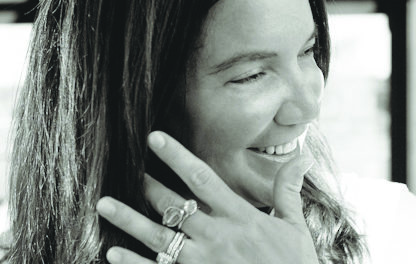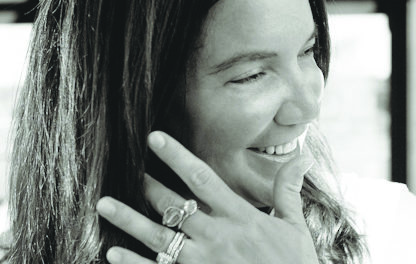 The Fourth of July has always been one of my favorite holidays.
The Fourth of July has always been one of my favorite holidays.
What’s not to like? The overwhelming swell of pride, the flags secured to porches, the cute little Jell-O molds made out of blue and red gelatin with Cool Whip lovingly smudged in between. It’s the time of year when everyone is reminded of what we all have in common, to preserve what we hold dear: those precious concepts of life, liberty, and the pursuit of happiness.
The other morning when I was pursuing the not so happy part of my existence by scraping the crusted toothpaste off my daughter’s sink with a blowtorch and an ice pick, I started thinking about what it might have been like that July back in 1776 at the Hancock household.
John would be coming home from a hard day’s work, you know signing the Declaration of Independence and all, happily swinging open the front door, tossing his papers on the sideboard and yelling, “Honey, I’m home.” He smiles as he takes in the house he’s built for his family, the smells coming from the kitchen . . . all the hard work. He even allows himself to think about a glass of brandy.
“This,” he thinks to himself, “is what freedom’s all about.” As he reaches for the snifter, he hears a loud crash from the kitchen and sees his wife, Dorothy, storming for the door. Before poor John can even say, “Guess what I did today?” she thrusts the baby into his arms, rips her flour-splattered apron from her waist, and tells him she’s taking the horse and buggy into town. You know what I‘m thinking? Dorothy had her own idea of freedom.
Now, all you history buffs out there, just allow me my fantasy. I’m sure they had a little help in all things domestic since John was one of the richest men in the thirteen colonies, kind of like a modern day Bill Gates. Not to mention his sweet Dolly probably came with a sweet dowry. Me, I came with an ‘87 Mazda 626 with a bad transmission and an overdue phone bill. But even though we started out poor in riches, I, at least, was rich with the idea of a marriage full of independence and equality and after 19 years, I still don’t know how I messed that one up.
“The cat threw up again,” my husband says as he steps over a hairball the size of a guinea pig.
“Where’s the Sweet ‘N Low?” he yells from the cupboard, his mouth so close to the pink box he could make out with it if he wanted to.
Truth be told, now that I think about it, my husband has never had our kids by himself overnight . . . ever . . . in the 14 years since they entered our lives. There was one night I went on a girls’ trip, but he had his mommy spend the night and invited the boys over for poker.
My mind wanders back to 1776 again and this time I think about Georgia’s signer of that historic document, Button Gwinnett. I picture him riding his horse back to his adopted home south of Savannah, on St. Catherine’s Island, tears welling up in his eyes. He thinks of his family waiting for him and how he can’t wait to tell them his own signature just sent the ultimate message to his native Britain to take their taxes and tyranny and put it where the sun doesn’t shine.
Meanwhile, his wife Anne curses under her breath as she finds yet another rattler on the imported rug in the middle of the main parlor. Before she can yell at her girls for leaving the front door open again, three hormone-infused corseted teens almost knock her down fighting over a pale pink gown with the orange organza rosettes sewn all over. This is where she gets down on her knees and prays that this will be the last time Button will leave her alone in this humid, hot, godforsaken swamp of a place ever again.
It looks to me like some things will never change, I think as I put down the blowtorch and move on to the girls’ bedrooms with a safety mask and a 30-gallon Hefty bag. This is also about the time I start to ponder the fact that my husband called to say he needed to play another eighteen holes because “it wasn’t that hot out, after all.”
All kidding aside though, what would we have done without these domestic women of the American Revolution? Even when their opinions about politics and war were considered unfounded and unnecessary in the first place, they still endured long separations, were left alone to run their households and raise their children, and were ultimately isolated to face an uncertain and volatile future.
Look at John Adam’s wife, Abigail. She raised three small children all by herself during the Revolutionary War, melted her pewter spoons over the stove for bullets when the ammunition was running low, and provided something to drink and a bed to sleep in for soldiers passing through town.
It seems to me that when we celebrate the Fourth of July and all that it means to us as a nation, we should also think of the great women behind the great men of the Continental Congress who drafted and signed the Declaration of Independence. These women chose fortitude over fear, freedom over tyranny, and independence over oppression just as their husbands did.
They’ve left us all a lasting legacy of hope and self-determination, not by writing the very words that have shaped our philosophy of what it means to be an American, but by living it.
So this Fourth of July, while I’m hauling all the American flags from the attic and thawing out the Cool-Whip, as I’m doing thirteen loads of laundry in honor of the thirteen original colonies, I’ll think of these women and all of the ones who came before and after them. The fact that I still have a lot of work to do in achieving my own state of personal domestic independence doesn’t seem quite as important anymore. Just taking the best care of our children, families, and communities is what matters most in the end.
Think about it this way. We all know who really runs the country anyhow, and unlike Abigail, Anne, and Dorothy, we don’t have to wear undergarments up to our armpits while we’re doing it.
Happy Fourth, Y’all!




